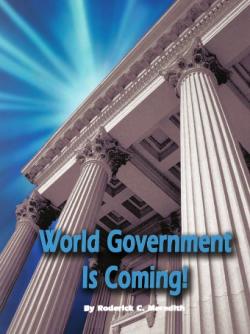European Union: Changes Ahead?
Political changes in Europe will soon affect the whole world—and are foretold in Bible prophecy. Do you know what Christ told His people to watch for as the end of the age approaches?
What does the 21st century hold for Europe? How will changes in Europe affect our world? Bible prophecies reveal the future!
In March of 2007, the European Union celebrated its 50th anniversary and rehearsed its achievements. Since the signing of the Treaty of Rome in 1957, Europe has put an end to Cold War divisions, opened borders, established a common market, a single currency, a European Bank, a European Court, enhanced the prosperity of its citizens and enjoyed nearly five decades of peace. Today, war is said to be "unthinkable" within the borders of the European Union—the world's largest internal market and a major source of financial aid for many countries. Considering these accomplishments some see the European Union as a powerful force of good and a unique model that will transform the world in a "New European Century" (Why Europe Will Run the 21st Century, Leonard, pp. 4, 19). However, former German Chancellor Helmut Kohl has said the 21st century "belongs to Germans," and American strategists see America's influence extending well into the 21st century. Others envision China and India playing bigger roles on the world stage as this century unfolds.
But what does the future really hold for Europe and countries that interface with this historic continent? Will the European Union be the key agent that will usher in a new global age of "peace, prosperity and democracy" (Leonard, p. 7)? Will Europe's liberal social model, its secular society and penchant for generating reams of legal regulations provide the basis for a brave new world of the future? Or will the days just ahead see a major transformation of the European experiment that will surprise even the secretive bureaucratic planners in Brussels? While the builders of "Europe" publish no blueprints and claim that "Europe is a journey with no final destination" (Leonard, p. 10), Bible prophecies have long indicated what lies ahead for Europe as we approach what the Scriptures refer to as "the end of the age" (Matthew 24:3). You need to understand the crucial events that are about to radically transform Europe and the world in which we live!
A Fragile Union
During the last fifty years the architects of the European Union have attempted to bind the diverse nations of Europe together with numerous treaties and myriads of regulations designed to produce "a deeper and ever closer union." However, the European Union is a project of the political elites that has failed to capture the hearts and imagination of the average person in Europe. Nearly half of the populations in the 27 countries of the European Union are negative about the project (BBC News, March 25, 2007)—including the people of Germany. Few citizens even bother to vote in elections for candidates to the European Parliament. In 2005, the citizens of France and the Netherlands—two of the founding members—soundly rejected the proposed European Constitution. Although the elites behind the European Union hope to enable Europe to speak with one voice, in order to play a bigger role on the world stage, European summit conferences are often plagued by personal confrontations between Europe's national political leaders and by the zealous defense of national interests—in spite of plenty of rhetoric about "shared" sovereignty. Highlighting the internal divisions within the European Union, the European Parliament—which has been likened to a modern "tower of Babel"—will spend nearly 1 billion euros a year on translation services because each of its 27 member nations insists that its language be officially recognized. The flagship European airline manufacturer Airbus is another example of the pitfalls and difficulties "sharing" sovereignty. Airbus, created to challenge the American giant Boeing, and once touted as the ideal model of European cooperation, has struggled due to the destructive rivalry between the French and German management groups and its unstable public/private structure (economictimes.indiatimes.com, March 5, 2007).
Long ago, God gave the prophet Daniel a vision of the future. Daniel foresaw the appearance at the end of the age of a European power with historical links to the ancient Roman Empire. This end-time political entity is portrayed as the feet of a great image—the feet made of a mixture of iron and clay—that is "partly strong and partly fragile… they will not adhere to one another" (Daniel 2:40–43). This is precisely what we see forming in Europe today—a potentially powerful, but fragile union of nations attempting to "share" sovereignty, yet reluctant to give up any national advantage. Bible prophecies indicate this arrangement will be short-lived and will be ended by the returning Jesus Christ—it will not dominate the 21st century (Daniel 2:44–45).
Surprises Behind Closed Doors!
From its inception, the architects of European unity have operated under a cloak of secrecy. Meetings are held and decisions are made—usually behind closed doors and primarily by un-elected officials. This lack of transparency has served to alienate significant portions of national populations. When voters are asked to express their feelings on an issue and they disapprove of a decision the European Union wants approved (such as the European Constitution), they have been asked to vote again—until they get it right! This essentially makes any vote meaningless—unless it delivers the right results! It also sends a message to the average European that their opinions do not really matter, because their political leaders will do whatever they want. Today, it is estimated that between 50 and 80 percent of the laws passed by national parliaments originated from Brussels, and national parliaments are merely "rubber stamping" legislation generated by European bureaucrats. This process fosters apathy and discourages people in Europe from taking an active interest in European Union affairs. While European political leaders talk about democracy, the real power in the European Union does not reside with the people, but rather with un-elected bureaucrats in Brussels and with the un-elected members of the European Court. Even the recent attempts to revive the European Constitution have been carried out in private discussions between Angela Merkel and individual national delegations instead of holding open debates on this crucial issue that affects the lives of all Europeans.
What the architects of Europe have created is a governmental and administrative structure that makes plans and decisions in secrecy behind closed doors by unelected officials who are not accountable to the people they supposedly serve. This is a system that has the potential of being hijacked for other purposes and taken in a different direction than where many assumed it was going. Bible prophecies describe this end-time political system as an animal (a beast – Daniel 7:7; Revelation 13:1–10), that will actually surprise the world when it is revived in its final form (Revelation 13:3). The Scriptures indicate this political creature will arise in Europe as a tolerant, peace-promoting endeavor, but it will eventually be transformed into a much more intolerant, militaristic beast that will persecute Bible-believing Christians (Daniel 11:36–39; Revelation 13:14–15). This is what Bible prophecy indicates is in store for Europe!
Germany's Emergence
The European Community was originally conceived by French planners as a way to bind Germany to Europe and prevent it from ever again dominating the continent. However, the last several decades have witnessed the emergence of a new, united, prosperous and more assertive Germany that is no longer content to merely play a subservient role in Europe. The European Union has been Germany's path to rehabilitation after the disasters and defeats of two World Wars. The German economy is now the most powerful in Europe. German Chancellor Angela Merkel served as the President of the Council of the European Union for the first six months of 2007 and is serving as the President of the G-8 (leading industrialized nations) for all of 2007. She has also been called the most powerful woman in the world (ahead of U.S. Secretary of State Condoleeza Rice), and she has been portrayed in the German press as the "Queen of Europe" for her diplomatic abilities (www.spiegel.de, March 12, 2007).
This resurgent Germany has called for the formation of a European army with a single unified command center—ostensibly for defense against terrorism and for peacekeeping duties abroad—and floated ideas about Germany developing its own nuclear weapons—again for defensive purposes (www.telegraph.co.uk, January 27, 2006). The German army is currently undergoing a major restructuring program to provide a rapid reaction force that can be deployed anywhere in the world. At the same time the EU is trying to create a European coastguard capable of stopping and searching vessels (which some fear is a European navy "by the back door"), Germany, Italy and Greece have ordered new, state-of-the-art attack submarines (www.telegraph.co.uk, May 21, 2006; naval-technology.com, March 14, 2007). In recent years Germany has begun dispatching troops to serve on missions in Afghanistan, the Middle East and in Africa—where they are gaining real-life combat experience.
Within the Euro-zone, Germany has gained a position of prominence. The single currency of Europe (the euro) is patterned after the German deutschemark. The European Central Bank is located in Frankfurt, Germany. A German financial firm recently attempted to take over the London Stock Exchange. Germany is the biggest financial contributor to the European Galileo satellite project (that will compete with the American GPS system) and the Germans have succeeded in having the main control center of the satellite system located near Munich, Germany (euobserver.com, December 6, 2005). Germany has also announced plans for a mission to the moon to explore its mineral resources—"without the help of its European neighbors" (www.spiegel.de, March 12, 2007).
The emergence of Germany as the leading power in Europe is also consistent with Bible prophecies about the end time. The Scriptures indicate that the Assyrians (the modern German nation; for more on this topic, please request our free reprint article, A Fourth Reich?) will play a major role at the end of the age as an instrument in God's hands (Isaiah 10:5–14) to correct His backsliding peoples who have failed in their God-given role to be lights to the world (Deuteronomy 4:1–10; for more on this topic, please request our free booklet, The United States and Great Britain in Prophecy). Modern Germany is indeed moving into this long-prophesied position as an instrument in God's hand!
Religious Roots Revived
Perhaps the most sobering comment coming from a German in recent years was the statement by Cultural Minister Bernd Neumann that "The medieval, Europe-wide German Reich [the Holy Roman Empire of the German Nation in the Middle Ages] is a valid model for the union of European countries today… [and] a valid model of the functioning of a superstate" (www.german-foreign-policy.com, September 1, 2006). The Holy Roman Empire was a multi-national, multi-ethnic construction that dominated central Europe (large parts of Germany, Austria, Italy, France, Switzerland, the Netherlands and the Czech Republic) for more than 800 years. The Holy Roman Empire was held together by the combined influence of both church and state. It was headed by an emperor who was crowned by the pope in Rome. It remains to be seen what sort of relationship will develop between Pope Benedict XVI, the first German pope in more than 1,000 years, and Angela Merkel, who has been promoted as the "Queen of Europe." They have met and both share the idea that religion should play a more prominent role in the unification of Europe.
For decades, popes in Rome have promoted the construction of a United Europe. They have offered the services of the Roman Church to help bring together the diverse peoples and nations of Europe. Pope Benedict and his predecessors have also spoken of the need to "re-evangelize" modern secular Europe. In fact, it was Pope John Paul II, speaking in Santiago de Compostella—the site where the re-conquest of Spain from the Muslims began—who urged Europeans "to discover their [religious] roots." This appeal to return to Europe's Roman Catholic religious roots has been a reoccurring theme in papal addresses in recent decades. Angela Merkel has also been a proponent (along with leaders from Poland, Spain, Italy and Austria—all heavily Roman Catholic countries) of including a clear reference to Europe's Roman Catholic heritage in the European Constitution.
Bible prophecies clearly indicate that as the end of the age approaches, Europe will see the revival of a political system that has historical links to the ancient Roman Empire (Revelation 17:10). Many leaders involved in the construction of a unified Europe have openly acknowledged they are trying to recreate the unity of the Roman Empire. The Scriptures also indicate this political system will revive its historical ties with the Roman Catholic Church and that an influential religious figure will play a pivotal role in this process (Revelation 17:1–7). This religious figure is prophesied to use supernatural powers to convince people to follow this European political "beast" (Revelation 13:11–15; 2 Thessalonians 2:1–12). Bleeding statues and visions of the Virgin Mary appearing on hillsides and buildings could be a foretaste of the types of "miracles" that are to come.
The current European Union is made up of 27 nations. However, unless the European nations can agree on reforms contained in the Constitution, the Union may not be able to function in an effective manner. The French are already having difficulty adjusting to the increasingly dominant role played by Germany. The expansion of the Union into Eastern Europe (an area of traditional German influence) further weakened the ability of France to determine the future direction of the EU. When Angela Merkel encountered reluctance on the part of the French to support an EU position, she indicated that Germany had other friends in Europe with whom they could work—the Italians. It is also significant that the Italian leader Romano Prodi has indicated that if Britain is reluctant to forge ahead with plans for more European integration, the British could be left behind.
One idea that continues to surface every time the EU nations encounter difficulties working together is that a "core group" of nations should move out ahead of the others to pursue a deeper integration. The Treaty of Maastricht actually has a provision that allows a group of eight or more nations to work together in specific areas and move out ahead of the rest. If the attempts of 27 nations to work together falter, this core group will eventually emerge—and in all likelihood it will be led by Germany. This is exactly what Bible prophecy has long indicated. The Apostle John wrote that "ten kings [nations or national leaders]… will give their power and authority [surrender or share their sovereignty] to the beast" (Revelation 17:12–13). The prophet Daniel, in describing this same end-time system, compares it to the two feet of a great image—and those feet have ten toes that he likens to ten kings (Daniel 2:40–45). These prophecies clearly indicate that the end-time revival of a political system in Europe that has historical links to the Roman Empire will have a core of ten nations. The stage is being set in modern Europe for the fulfillment of these long-pondered prophecies!
The months ahead will be filled with vitally important events. Powerful forces are working behind the scenes to influence the course of events in Europe. What most people today do not realize—even the secretive planners in Brussels and the long-range strategists in the Vatican—that God has revealed the future of Europe in the pages of the Bible (2 Thessalonians 2:9–12). God has provided this revelation so His servants can warn this world about what is actually going to happen (Amos 3:7; 2 Peter 1:19–21) and that those who heed these warnings will not be surprised or deceived by the swirl of events that will precede the second coming of Jesus Christ. This is one reason why Christ tells us to watch world events in the light of Bible prophecy (Matthew 24:42–44). The question is, will you recognize the significance of what is really happening in Europe and how these events tie into end-time prophecies recorded in the pages of your Bible?






